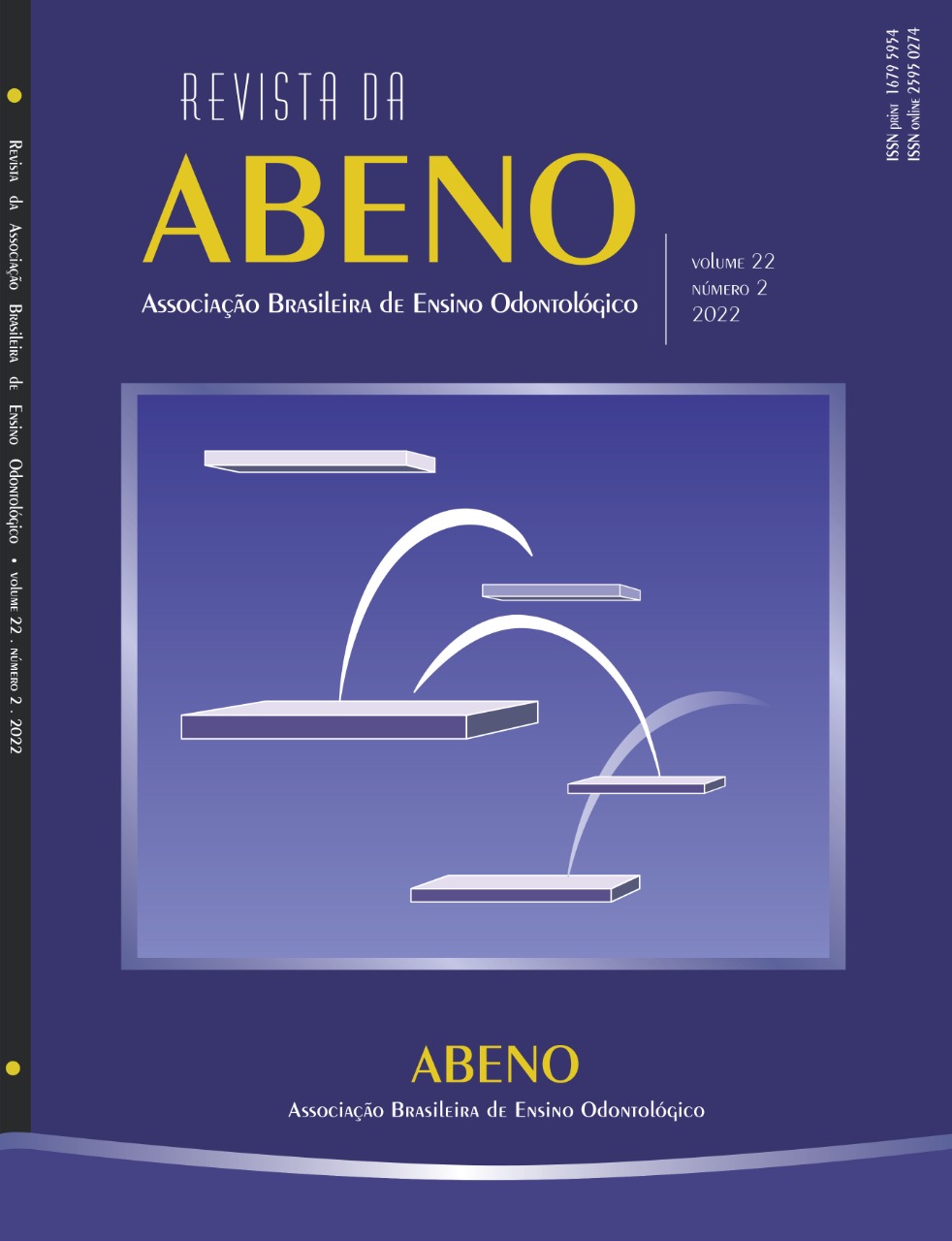Percepção de docentes de Odontologia sobre a avaliação da aprendizagem pelo OSCE
DOI:
https://doi.org/10.30979/revabeno.v22i2.1090Palavras-chave:
Odontologia, Avaliação Educacional, Competência ClínicaResumo
A formação superior na área da saúde tem, entre outros, o desafio de permitir que o aluno desenvolva conhecimentos, habilidades e atitudes para o exercício da sua profissão. Nesse caminho de ensino, a avaliação da aprendizagem se torna uma aliada, permitindo que instituição, professores e alunos possam refletir sobre o resultado de suas ações. O Exame Clínico Objetivo Estruturado (Objective Structured Clinical Examination, OSCE) é um instrumento de avaliação de competências clínicas utilizado inicialmente no curso de Medicina e expandido desde então para os demais cursos das ciências da saúde. O objetivo deste estudo é relatar experiência de inserção do OSCE no curso de Odontologia da Faculdade Pitágoras (Unidade Guarapari/ES). Foi realizado workshop para professores da área, abordando três atividades: palestra explicativa apresentando o OSCE, demonstração e vivência prática do planejamento e elaboração do instrumento avaliativo; e discussão com os participantes sobre a ferramenta aplicada à sua realidade docente. Seguidos quatro meses, para organização institucional, o OSCE foi implementado como avaliação formativa e somativa em todas as turmas do curso, que já estavam inseridas na clínica odontológica, levando-se em consideração adaptações sugeridas pelos professores para atender às necessidades da realidade local, mas preservando a aderência do modelo em avaliar as competências estimadas. A experiência aponta o OSCE como ótimo instrumento de avaliação em Odontologia e a dinâmica do workshop como ferramenta para o entendimento, demonstrando que o treinamento de professores foi essencial para alcançar o sucesso. O grupo está motivado para continuar adotando o OSCE como instrumento de avaliação de competências clínicas.
Downloads
Referências
Panúncio-Pinto MP, Troncon LEA. Avaliação do estudante: aspectos gerais. Medicina. 2014; 47(3):314-23.
Luckesi CC. Avaliação da aprendizagem escolar: estudos e proposições. 22ª ed. São Paulo: Cortez; 2011. p. 27-32.
Moretto VP. Prova: um momento privilegiado de estudo não um acerto de contas. Rio de Janeiro: DP&A; 2002.
Luckesi CC. Avaliação da aprendizagem escolar: estudos e proposições. 22ª ed. São Paulo: Cortez; 2011. p. 45-60.
Consolaro A. O “ser” professor: arte e ciência no ensinar e aprender. 4ª ed. Maringá: Dental Press; 2005.
Barbosa JRA. A avaliação da aprendizagem como processo interativo: um desafio para o educador. Rio de Janeiro: Faetec; 2008.
Oliveira-Barreto AC, Guedes-Granzotti RB, Domenis DR, Pellicani AD, Silva K, Dornelas R, et al. Métodos de avaliação discente em um curso de graduação baseado em metodologias ativas. Rev Ib Est Ed. 2017; 12(2): 1005-19.
Santos MR, Varela S. A avaliação como um instrumento diagnóstico da construção do conhecimento nas séries iniciais do ensino fundamental. Rev Eletro Edu. 2007; 1(1), 146-63.
Mossey PA, Newton JP. The Structured Clinical Operative Test (SCOT) in dental competency assessment. Dr Dental J. 2001; 190(7): 387-90.
Harden RM, Stevenson M, Downie WW, Wilson GM. Assessment of clinical competence using objective structured examination. Br Med J. 1975; 1(5955): 447-51.
Shailesh M, Lele MDS. A mini-OSCE for formative assessment of diagnostic and radiographic skills at a dental college in India. J Dent Educ. 2011; 75(12): 1583-92.
Troncon LEA. Avaliação de habilidades clínicas: os métodos tradicionais e o modelo “OSCE”. Olho Mágico. 2001; 8(1): 8-12.
Patricio MF, Julião M, Fareleira F, Carneiro AV. Is the OSCE a feasible tool to assess competencies in undergraduate medical education? Medical Teacher. 2013; 35(6): 503-14.
Bloom BSS, Englehart MD, Furst EJ, Hill WH, Klathwohl DR. Taxonomia de objetivos educacionais. Porto Alegre: Globo; 1976.
Troncon LEA. Utilização de pacientes simulados no ensino e na avaliação de habilidades clínicas. Medicina. 2007; 40(2): 180-91.
Logar GA, Coelho COL, Pizi ECG, Galhano GAP, Neves AP, Oliveira LT, et al. OSCE na avaliação clínica odontológica: relato de experiência com estudantes de graduação. Rev ABENO. 2018; 18(1):15-24.
Gontijo ED, Alvim CG, Lima MECC. Manual de avaliação da aprendizagem no curso de graduação em Medicina. Rev Docência Ens Sup. Belo Horizonte. 2015; 5(1): 205-326.
Brasil. Lei n. 9.394, de 20 de dezembro de 1996. Lei de diretrizes e bases da educação nacional. Diário Oficial da União. [Cited Feb 26, 2022]. Available from: http://www.planalto.gov.br/ ccivil_03/leis/l9394.htm.
Lima FR, Rêgo SRC, Silva J. Instrumentos avaliativos no ensino de língua portuguesa: um olhar para a pesquisa e os métodos. Adluente. 2016; 1(2): 91-115.
Downloads
Publicado
Como Citar
Edição
Seção
Licença
Copyright (c) 2022 Revista da ABENO

Este trabalho está licenciado sob uma licença Creative Commons Attribution-NonCommercial 4.0 International License.
Autores que publicam nesta revista concordam com os seguintes termos:
a) Autores mantém os direitos autorais e concedem à revista o direito de primeira publicação, com o trabalho simultaneamente licenciado sob a Licença Creative Commons Attribution que permite o compartilhamento do trabalho com reconhecimento da autoria e publicação inicial nesta revista.
b) Autores têm autorização para assumir contratos adicionais separadamente, para distribuição não-exclusiva da versão do trabalho publicada nesta revista (ex.: publicar em repositório institucional ou como capítulo de livro), com reconhecimento de autoria e publicação inicial nesta revista.
c) Autores têm permissão e são estimulados a publicar e distribuir seu trabalho online (ex.: em repositórios institucionais ou na sua página pessoal) a qualquer ponto antes ou durante o processo editorial, já que isso pode gerar alterações produtivas, bem como aumentar o impacto e a citação do trabalho publicado (Veja O Efeito do Acesso Livre).






